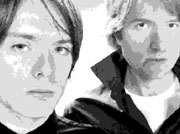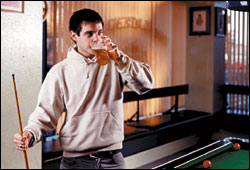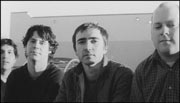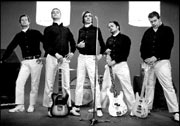AIR
Experience Music Project—Sky Church, 770-2702, $17.50 9 p.m. Sat., July 7
SCRUMPTIOUS CHEESES, intoxicating wines, deep, dirty kisses: France has given the world many wonderful things. It is a country of great cultural wealth, and its fertile creative loins have produced international figures in nearly every area of the arts, many of whom have traveled across the pond and infiltrated our national consciousness. What ugly American hasn’t absorbed some bit of French literature, be it Rimbaud, Sartre, or even, for chrissakes, Les Mis, or become familiar with the ubiquitous calendar reproductions of Monet and C麡nne? Even yokels who’ve never set foot inside an art-house theater have some inkling of French cinema via blond beauties Bardot and Deneuve and their dangerous curves. Then, of course, there is the cuisine, the couture, the general je ne sais quoi of a population that has always stood proudly as a sort of sleek, sophisticated ying to America’s slobbery eager-puppy yang.
The major glitch in the Gallic superiority equation: A music scene that has, with few exceptions, been utterly, drastically uncool ever since the advent of rock ‘n’ roll. After Edith Piaf, the pompadoured Elvis knock-off Johnny Hallyday and (admittedly influential) lounge lizard Serge Gainsbourg were the best of a rather shoddy export bunch of disco ducks and soft rockers, barely limping across European borders before collapsing under the weight of their own negligible talents. Somehow, the famous French flair for all things creative fell flat as a bad souffl頡s soon as its citizens hit the recording studio.
That is, until the astonishing beats renaissance of the late ’90s: Suddenly, dance music, a genre trying desperately to fulfill its own hype in America, got an amazing infusion of energy from, of all places, old-world mainstay Paris. Daft Punk’s alarmingly addictive electro shenanigans; the funky, sunshiney house anthems of Cassius and Dimitri; the sexy disco rave-ups of Mirwais—they all hit the U.S. like a fine blast of Evian after months of murky tap water. Still, these artists’ influence was mainly confined to the dance floor—and Americans never minded giving up much territory on such a relatively small piece of the musical pie. But something larger was coming, a sort of musical stealth bomb in the form of two Versailles art students: Nicolas Godin and Jean-Benoit Dunckel were about to become the biggest thing on the coffeehouse/dinner party/comedown circuit since Portishead. On their 1998 U.S. debut Moon Safari, the pair’s Moogy, moody, and charmingly retro electro-pop soundscapes were like the finest-gauge cotton that, when woven together with American expat Beth Hirsch’s cashmere vocals, invited jaded, overstimulated listeners to snuggle into a warm aural cocoon. Saucier tracks like the single “Sexy Boy” kept the album from sinking too deep into wallpaper territory and landed the pair respectable rotation on MTV. Inevitably, the duo were soon the subject of a thousand breathy magazine profiles and smug hipster endorsements.
FOLLOWING THE low-hype release of the prequel, Premiers Symptomes, Air took on another full-fledged project—one that would cement the band firmly beyond one-trick-pony status. A soundtrack to director Sofia Coppola’s dreamy ’70s tone poem of a film by the same name, The Virgin Suicides was a gorgeous, woozy piece of Americana—and one of the most integral musical accompaniments to a film since Pulp Fiction or Trainspotting. How did two men who barely spoke English manage to so completely evoke a time and a place that most likely never existed beyond the nostalgia of those who lived it? Well, adolescent longings and sexual awakenings are certainly universal—and American teens, it seems, don’t exactly have the copyright on getting stoned and listening to Pink Floyd.
“You have to follow the direction of the image,” Godin explains via phone from Manhattan. “We used to work with a screen in the studio, and we just followed our indications. You have to know that for us music is a language, and if what is on the screen says you have to be happy or sad or mysterious, we think of that in terms of notes, so we translate what we see on the screen into music, the way we talk.
“Music is my first language,” he continues. “It is much easier to make music than to talk, you know?” If music is the band’s first language, uninformed listeners would hardly know French is their second: Whether or not it is calculated to reach a larger audience, meant to imitate the artists they admire, or simply an arbitrary preference, Air’s often obtuse, occasionally poetic lyrics are, without fail, sung in English.
As they say, it is always and never the same on the pair’s latest release, 10,000 Hz Legend, a mod-ish, heavily atmospheric piece of futurama. At times, Legend sounds like glorified Muzak, elevated by an arbitrary stamp of Continental cool; elsewhere, tracks like “How Does It Make You Feel” are, despite their shameless AM croonings, completely transportive. The somnambulant kitschy-tech of 10,000 Hz Legend could easily backdate itself 15 years, especially with the addition of Beck—himself no stranger to culture mining—on two tracks. Are all these machine dreams just tongue-in-cheek retro or honest- to-goodness nouveau inspirations? With such purposefully obtuse figures, it’s hard to tell, but the pair always adamantly refuse the irony label. The sphinxlike Godin will only declare, “We have inspiration and that’s it, we don’t know where it comes from.” With their shaggy bangs, famous friends, and five-minutes-from-now wardrobes—not to mention their on-point musical references—Godin and Dunckel fit the hipster mold like Brooke fit her Calvins, but one has to wonder whether what appears to be clever nostalgia is merely referencing what, to two boys from the French suburbs, never really went away at all.








